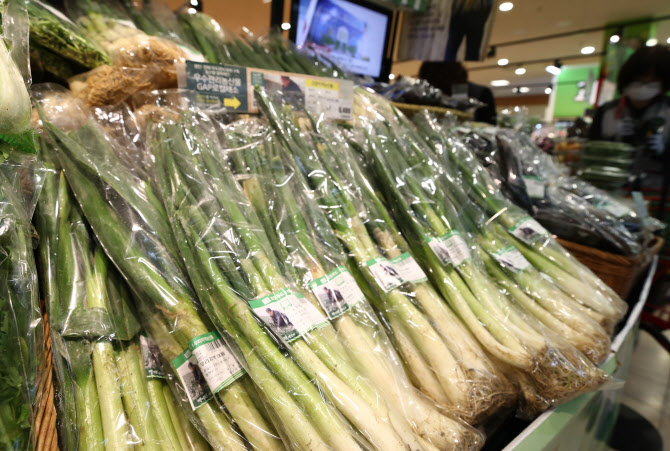|
[세종=이데일리 원다연 기자] Consumer prices rose 1.1% last month, the largest increase in a year. This is the effect of a significant increase in prices as demand for agricultural and livestock products increased to the Lunar New Year holiday last month in a situation where supply was scarce due to poor crop conditions last year. The government is expected to start shipping early-growing species (a species that matures early among crops of the same species) from this month, and expects that the supply and demand conditions of agricultural and livestock products will improve somewhat, but continued price stabilization measures such as releasing government stockpiles for items that continue to be priced strong. I plan to go.
Green onion 1675 won→4885 won·eggs 5184 won→7591 won’Mugwort’
According to the consumer price trend released by the National Statistical Office on the 4th, the consumer price index last month was 107.0, up 1.1% from the same month last year. The consumer price index rose the most since February last year (1.1%), expanding to 1% in 5 months.
The price of agricultural and livestock products soared, raising the overall consumer price last month.
Last month, the price of agricultural and fishery products rose 16.2% year-on-year, the highest in 10 years since February 2011 (17.%). Agricultural products rose 21.3% and livestock products rose 16.1%. By item, green onions (227.5%), apples (55.2%), and eggs (41.7%) were particularly high. Pork also rose 18% compared to the same month last year, and beef prices also rose 11.2%.
According to the aT (Korea Agricultural and Fishery Food Distribution Corporation) price information, in February last year, the retail price of green onions (based on heavy goods) from 1,675 won per kilogram jumped to 4885 won last month, and the price of eggs rose from 5184 won per 30 pieces to 7591 won. During the same period, Korean pork belly rose from 1623 won per 100g to 2075 won, and Korean beef sirloin from 9217 won per 100g to 10,54 won.
Economic Trend Statistics Reviewer at Statistical Office, Eoun-seon said, “The price of agricultural and fishery products has risen significantly as demand increases in households due to the effects of a decrease in supply due to sluggish crops and strengthening of social distancing, and last month’s holiday demand.”
Despite slowing growth in core inflation, the living price index rose the most in 11 months.
Accordingly, the fresh food index, which is highly linked to the price of agricultural and livestock products, also showed a significant increase at 18.9% year-on-year. The living price index, which is mainly composed of items with high purchase frequency and high expenditure, also rose 1.2%, recording the largest increase since March last year (1.8%). Source prices (excluding agricultural products and petroleum products), which indicate the key trend of inflation, rose 0.8% year-on-year, compared to a decrease in the increase compared to the previous year (0.9%). This means that the perceived inflation burden was remarkable.
By purpose of expenditure, food and non-alcoholic beverages increased by 9.7%, food and lodging (1.2%), and health (1.1%). On the other hand, entertainment and culture (-0.7%), communication (-1.2%), transportation (-2.0%), and education (-2.9%) declined.
By item quality, products rose 1.9% YoY and services rose 0.5% YoY. Commodity prices were driven by rising prices of livestock and fisheries, and services rose mainly in rent (0.9%) and personal services (1.6%). Last month’s rent rose 1.2% year-on-year and monthly rent rose 0.5%, the largest increase since March 2018 (0.9%). An official from the National Statistical Office explained that “the situation is continuing the upward trend because supply is less than demand.”
|
“Improving the supply and demand conditions for agricultural and livestock products… Management of items that continue to be strong in price”
In this month, overall inflation will continue due to the recent rise in international oil prices, but in the case of agricultural and livestock products, the increase is not expected to expand further due to improvement in supply and demand conditions. Dubai oil prices rose from 54.8 dollars per barrel in January to 60.9 dollars last month. Petroleum prices last month fell 6.2% year-on-year, slowing down from the previous month (-8.6%).
“Consumer prices this month are variables such as the supply and demand conditions of livestock products, the flow of international oil prices, and policy factors such as the expansion of free education. Is expected to act as a downside factor for inflation.”
However, the government plans to stabilize prices by expanding imports and applying discount coupons for items that continue to be strong in price. The government previously imported 44 million eggs, followed by an additional 20 million imports this month, and is continuing a 20% discount event. In addition, for onions, it is instructing the growth management of early-growing species.
An official from the Ministry of Science and Technology said, “We will strengthen the inspection of the factors of inflationary anxiety through inflation-related vice ministers meetings, and actively respond to price stability.


